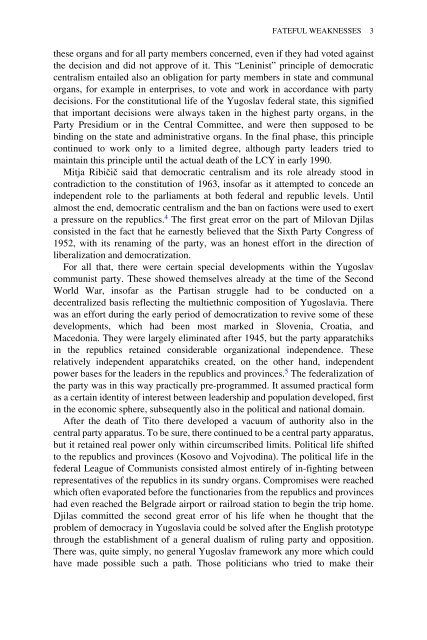Yugoslavia: A History of its Demise - Indymedia
Yugoslavia: A History of its Demise - Indymedia
Yugoslavia: A History of its Demise - Indymedia
Create successful ePaper yourself
Turn your PDF publications into a flip-book with our unique Google optimized e-Paper software.
FATEFUL WEAKNESSES 3<br />
these organs and for all party members concerned, even if they had voted against<br />
the decision and did not approve <strong>of</strong> it. This “Leninist” principle <strong>of</strong> democratic<br />
centralism entailed also an obligation for party members in state and communal<br />
organs, for example in enterprises, to vote and work in accordance with party<br />
decisions. For the constitutional life <strong>of</strong> the Yugoslav federal state, this signified<br />
that important decisions were always taken in the highest party organs, in the<br />
Party Presidium or in the Central Committee, and were then supposed to be<br />
binding on the state and administrative organs. In the final phase, this principle<br />
continued to work only to a limited degree, although party leaders tried to<br />
maintain this principle until the actual death <strong>of</strong> the LCY in early 1990.<br />
Mitja Ribičič said that democratic centralism and <strong>its</strong> role already stood in<br />
contradiction to the constitution <strong>of</strong> 1963, ins<strong>of</strong>ar as it attempted to concede an<br />
independent role to the parliaments at both federal and republic levels. Until<br />
almost the end, democratic centralism and the ban on factions were used to exert<br />
a pressure on the republics. 4 The first great error on the part <strong>of</strong> Milovan Djilas<br />
consisted in the fact that he earnestly believed that the Sixth Party Congress <strong>of</strong><br />
1952, with <strong>its</strong> renaming <strong>of</strong> the party, was an honest effort in the direction <strong>of</strong><br />
liberalization and democratization.<br />
For all that, there were certain special developments within the Yugoslav<br />
communist party. These showed themselves already at the time <strong>of</strong> the Second<br />
World War, ins<strong>of</strong>ar as the Partisan struggle had to be conducted on a<br />
decentralized basis reflecting the multiethnic composition <strong>of</strong> <strong>Yugoslavia</strong>. There<br />
was an effort during the early period <strong>of</strong> democratization to revive some <strong>of</strong> these<br />
developments, which had been most marked in Slovenia, Croatia, and<br />
Macedonia. They were largely eliminated after 1945, but the party apparatchiks<br />
in the republics retained considerable organizational independence. These<br />
relatively independent apparatchiks created, on the other hand, independent<br />
power bases for the leaders in the republics and provinces. 5 The federalization <strong>of</strong><br />
the party was in this way practically pre-programmed. It assumed practical form<br />
as a certain identity <strong>of</strong> interest between leadership and population developed, first<br />
in the economic sphere, subsequently also in the political and national domain.<br />
After the death <strong>of</strong> Tito there developed a vacuum <strong>of</strong> authority also in the<br />
central party apparatus. To be sure, there continued to be a central party apparatus,<br />
but it retained real power only within circumscribed lim<strong>its</strong>. Political life shifted<br />
to the republics and provinces (Kosovo and Vojvodina). The political life in the<br />
federal League <strong>of</strong> Communists consisted almost entirely <strong>of</strong> in-fighting between<br />
representatives <strong>of</strong> the republics in <strong>its</strong> sundry organs. Compromises were reached<br />
which <strong>of</strong>ten evaporated before the functionaries from the republics and provinces<br />
had even reached the Belgrade airport or railroad station to begin the trip home.<br />
Djilas committed the second great error <strong>of</strong> his life when he thought that the<br />
problem <strong>of</strong> democracy in <strong>Yugoslavia</strong> could be solved after the English prototype<br />
through the establishment <strong>of</strong> a general dualism <strong>of</strong> ruling party and opposition.<br />
There was, quite simply, no general Yugoslav framework any more which could<br />
have made possible such a path. Those politicians who tried to make their
















